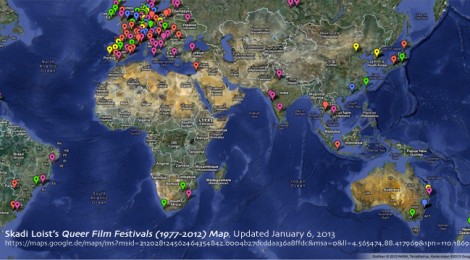
Presenting Queer Film Festival Studies
As identity-based festivals, queer film festivals have a specific relationship to the audience to which they cater. More specifically, most of these festivals have had a strong connection to the political and social movement behind the lesbian and gay/queer agenda and try to maintain this relationship between cultural event and political framework […]. Because of this history, queer film festivals have a strong tradition of a nuanced critical inquiry into the interconnections of cultural event management, community politics, nation state politics, funding and marketing strategies, and organizational structures […]. [From Skadi Loist and Marijke de Valck, ‘LGBT / Queer Film Festivals’, Film Festival Research, last updated November 2012]
Festivals are the primary markets for international queer film, but they do not simply acquire and screen the films they show; they actually create the economic conditions that enable their production. This is not to imply that queer internationalism is merely inauthentic or commercial and thus without any kind of political viability. Rather, what it indicates is that scholars, activists, and festival directors must begin to look at the economy of queer cultural production as an essential element of queer collectivities and the institutions they form. Conceiving of an international queer community through cultural circulation and consumption begs significant questions about […] the role of the festival in defining a gay and lesbian class identity within this global economy. [From Ragan Rhyne, ‘The Global Economy of Gay and Lesbian Film Festivals’, GLQ: A Journal of Lesbian and Gay Studies, Volume 12, Number 4, 2006]
As the above two scholarly excerpts indicate, the subject of queer film festivals is one which raises numerous issues of central importance to queer cultural studies more generally. For this reason, as well as to celebrate the work of scholars who have shared their findings in this field online, GQC is delighted to announce that its latest set of links to open access queer film studies, curated as usual by Catherine Grant, is devoted to the topic of Queer Film Festival Studies.
This most recent collection in the GQC Resources section includes a link to the full, interactive, version of the above map — created by pioneering queer film festival scholar Skadi Loist (co-founder, with Marijke de Valck, of the Film Festival Studies Network) — which shows 256 LGBT/queer film festivals existing globally since 1977.
Please click here if you’d like to be almost effortlessly transported to the new Resources page.

 RSS - Posts
RSS - Posts